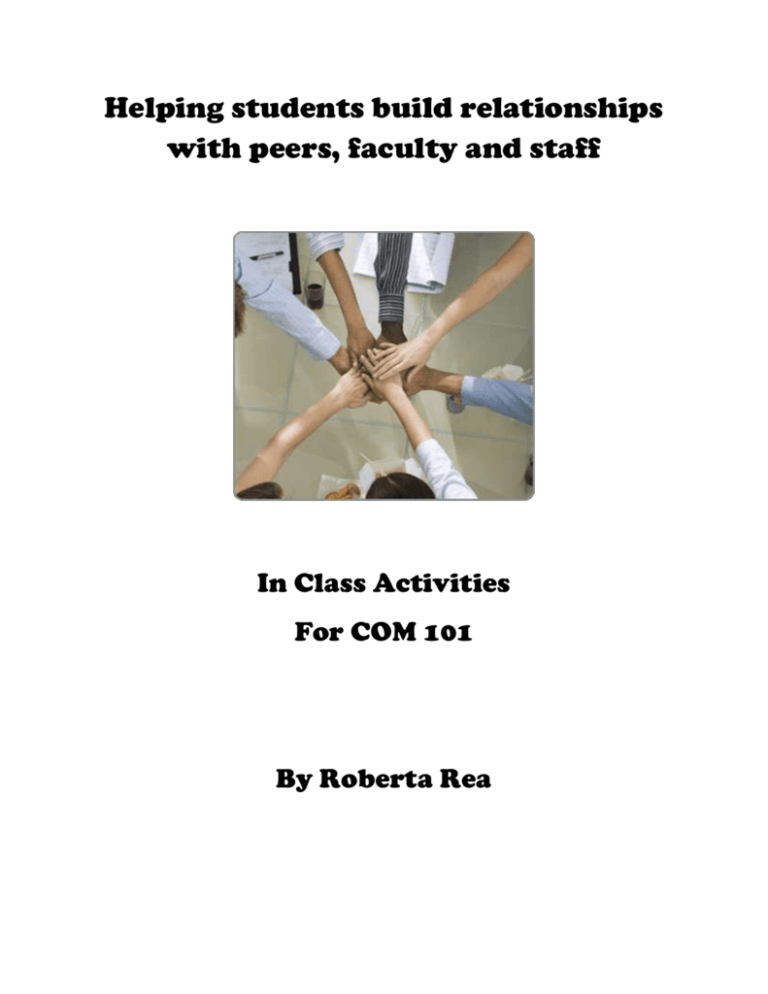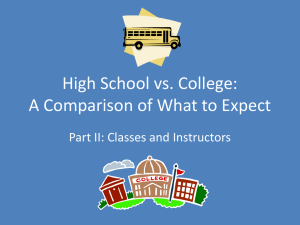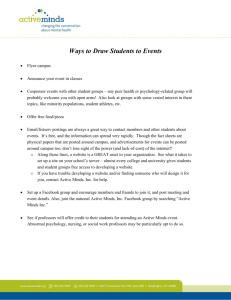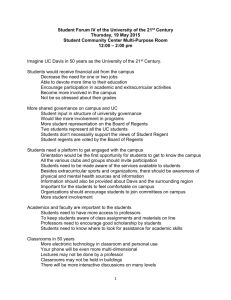Class Activities - Oakland University
advertisement

Helping students build relationships with peers, faculty and staff In Class Activities For COM 101 By Roberta Rea Quick Team builders- to incorporate into classes Grizzlies and Growls Each week, classmates will share one “grizzly” a highlight from their week, and one “growl” a lowlight from their week. This experience helps classmates empathize and we’ve even seen classmates offer to help in certain situations. I think it is helpful as a teacher to get a quick snap shot of where each student is. It is helpful for the student that shares because it is safe, and now people at school know what their high and low are. Lastly, it is helpful for classmates to see that each students week has ups and downs—they are not alone in this. Question of the week Here are some sample questions for a “question of the week” teambuilder- it’s a quick way to have the group share opinions, and a way to get students thinking and talking. A great starter activity for any class! Sample Questions: Who is the most relevant person in our time? What is the best movie you have ever seen? What is the most beautiful thing about people? What is the most honest thing you have known? What is the ugliest thing you know? What do you like to do most with a free hour? On what basis do you select your friends? What is the most overwhelming thing you know? What is the greatest problem in the United States? What thing makes you feel most humble? What is the greatest value that guides your life? If you could choose to be an animal other than man, what animal would you choose to be? What is the greatest crime one man can commit towards another? What is the best book you have ever read? For what do you think you would be willing to lay down your life? How would you symbolize the human soul? (A rose, a sunset, a fountain, etc.) If you were tape recording the sound of violence, what sound would you use? What sound would you use for beauty? If the atomic bomb were going to explode in ten minutes, what would you do for those ten minutes? If you could travel to one place in the world, where would you go? What is your strongest emotion? What one word would you put on your gravestone? Choose a word which best describes your total life up to this moment of time. What is your biggest worry? What is the most beautiful thing you have ever seen? What do people like best about you? What do you think of when you think of tragedy? What person has influenced your life most? What skill do you need in order to succeed? What talent should you develop? What makes you most secure? What institution is most in need of change? What word best describes advertising? Choose a word to describe a sunset. When do you feel most lonely? When do you sense being most alive? What T.V. advertisement bothers you the most? Choose a word which you feel describes old people. What is the biggest waste you know of? What will you be doing ten years from today? What future discovery do you anticipate most? What person would you follow the farthest? What one-day in your life would you like to live over? Objective: Building relationships with peers Handout: Building Relationships in College One of the best things about going to college is meeting new people. Many students learn just as much from their peers in college as they do from their professors. Here are some tips to help make many friends… Join clubs and groups. This is the easiest and most effective way to meet new people with similar interests. Don't be afraid of going by yourself. That is the only way you can get to know people in a personal level, especially at universities. You could try a group relating to your interests (newspaper for writers), or a totally random club (like snorkeling). Check your college website, Facebook profiles, and flyers around the school for when clubs meet and what clubs you can join. Participate in sports or some other activities. IM Sports are a great way to meet new people because you all have a common goal. You spend a lot of time together practicing and it helps develop teamwork. Most of the time your team does turn into family. If you are not athletic, try going into something like theatre or music. If you are not good at any of these activities, try the clubs. Go to events. There's nothing like a good football game to build camaraderie. If football isn't your thing, there are usually poetry readings, concerts, art shows, dances, contests, or other events around campus. Asking people about local events is a useful conversation starter. Talk to people. You can't make many new friends while sitting in a dark corner of the library unless there are other people just like you sitting in the dark corner of the library. Ask people who take classes with you questions about the material covered. Even if you don't have a question, classwork is a great icebreaker. Other great conversation starters are upcoming events and holidays/vacations, sports, food, music, etc. Don't do your homework in your dorm room or apartment. Most dorms have a lounge or common area where you can work instead. When you must be in your dorm for studying, leave the door open. If you're an outdoors person, go outside to work. While you may not enjoy the same level of privacy, people will approach you in time. Try doing it in school too. The campus has many common areas where you can study and congregate. Don't give up. Freshman year is a major change and many people flip out and give up. Many freshman still haven't left their nest and the transition from being with close friends, siblings, or with their parents to a new environment might be difficult. This usually happens with students that go to college that is far away from home. Don't let this happen to you. It may take an entire year before you really start meeting people. Usually most college students that are not in sports, music or theatre, or in some technical program don't meet people really well until sophomore and even junior year! Realize that once you have a major targeted and are done with your general classes, you'll find several people who have a similar schedule. This eases the friend-making process tenfold. If you are taking generals, try to have a path too in your major so you can easily meet people with common goals and interests. Get a job! Often, finding a position as a tour guide or a clerk in the bookstore will allow you to form common bonds with your coworkers which could reward you with new friendships, and a little spending money. You can do it outside the college too. Go downtown If you are living in a smaller school, you can meet people off campus and in the community. Check out events like movies, the mall, bowling, festivals, fairs, local shows and concerts, and even go shopping at bit. This is a great way to meet people of all ages. Get connected. With the modern era of the internet, when you are sitting on here finding out how to make friends in college, add some people in your college or your community. You can go on Facebook and add classmates. Join campus groups on Facebook with common interests. You can also get connected to your friends at home. Hang with your hometown and go from there If your college is close to your hometown, you may see familiar faces in college. Meet some of your old friends and see if they can introduce you to their friends. This will make it easier and your friends will more likely have friends that are like you. You can hang out with your old buddies from high school, but be sure to make sure you get out of your nest and meet new people too. Be approachable and compassionate Smile and look confident. Be nice to other people, open doors for people, help them with their homework. These small things will help you a long way. Ideas from: Your College Experience: Strategies for Success By John N. Gardner (2009) and Making Friends in College wikihow.com Four types of student organizations I might be interested in: ______________________________________________________________________________ ______________________________________________________________________________ ______________________________________________________________________________ _____________________________________________________________________________ Three places on campus that it would be fun to work at ______________________________________________________________________________ ______________________________________________________________________________ ______________________________________________________________________________ Two Classes that I would benefit from studying with a partner _______________________________________________________________________________ _______________________________________________________________________________ One benefit from meeting new people in college ______________________________________________________________________________ Objective: Building relationships with peers Activity: The Puzzle The point of this activity is to encourage students to gain insight on how they function in groups - what role they play, how they interact with others, etc. You can also have them relate this to life in general - do they always take the role of leader, charge in, observe, etc. I set it up giving 2 instructions & asking for leaders (I had 4 puzzles, 20 students = 5 members per group) First I explain 2 instructions: #1 No talkingThis is an activity where students are to pay attention to their “inner scripts” and how they function in a group, as you are working please notice your actions and reactions to other students. How do you share your ideas? How do you feel when the group is moving in a different direction? At what point (if any) do you “give up”? "Research has suggested that between 60 and 70 percent of all meaning is derived from nonverbal behavior." Engleberg,Isa N. Working in Groups: Communication Principles and Strategies. (2006) #2 Finish First There are 4 puzzles and the 1st group of students that finish their puzzle wins candy After all but one group completed the puzzle I had them write personal reactions to the experience in their journals – In Class Journal Questions: 1) What role did you play in the group? 2) What was your behavior? What helped the group? What didn’t help the group? 3) How did you respond to the behaviors of others? 4) How did this make you feel? 5) How was your behavior and feelings similar to past experiences working in groups? 6) What did other students do to help the group? Did anyone not help the group? 7) How would you like to be perceived when working in a group? 8) How do you think you were perceived in this group today? Most students were very aware of the behaviors of others in the group, but didn't know how or were unwilling to respond or take action. For example, every group had at least one observer. Most people said that there is always one person who doesn't contribute. I would like to guide them to discovering, for instance, that some people are observers, but may still be contributing and that those who appear to be observers may need encouragement to join in. I think my biggest surprise in this experience was that everyone just let the observers observe, or be nonparticipants. One student never really became a part of any group. She sat several feet away from a group and observed. I felt bad for her and debated whether or not to try to get her into a group, but decided not interfere in any way. I still feel a little guilty about this. I wanted to "fix" it. Taken and adapted from --Antoinette Phillips, Child Development, El Camino College (CA) 2010 Objective: Building relationships with peers Activity: The Murder Mystery Instructions This exercise provides the facilitators with a chance to assess the group membership and leadership skills the participants possess. It is a group task assignment will reveal behaviors in this situation including communicationlistening skills, initiative, assertiveness, openness, constructiveness, and general personality characteristics. Facilitator's Role The facilitator will announce the task and rules to the participants. 1. Announce the task: The group is to determine the murderer, the motive, and weapon from the clues which will be passed out. There is one and only one correct solution to the mystery. 2. The clues are passed out as evenly as possible though some participants may end up with more or less clues than others. 3. The participants may not give their clue slips to another participant nor may they show the slip to another person. *4. The group must be in full agreement to present their answer to the facilitator but the solution may be decided by consensus. If the solution is even partially in error, the facilitator will tell the group to try again without telling them which (If any) parts of the answer are correct. 5. Newsprint, pencils, magic markers, masking tape are provided if the group decides to use these in arriving at a solution. They may organize themselves in any way and use any method to work out a solution so long as the given rules are followed. Facilitators are involved only if the rules are broken. 6. The group has until 7:00 p.m. to finish the task. Once the task is completed a discussion by the participants of the group's dynamics and processes can begin. Discussion guidelines for the facilitator are on a separate paper. Things to know: As a facilitator it is not your position in this task to entertain questions such as "Should we break down into smaller groups?" Let the participants know that you will let them know if they are breaking the rules but other than that, they are on their own. They may write down their clues on the newsprint, post the newsprint, read out their clues, work independently once clues are posted...*Once the group says they are ready to get feedback on their solution, it is your job to make sure everyone is willing to check the solution. They may be willing to check a solution even though they do not all want to test the solution with you. The minimum of directions will be given to the participants. Post Activity Facilitation Questions 1. How did the team approach the task? 2. How did the members share information? 3. What member actions helped the team to accomplish its task? 4. What member actions hindered the team in completing its task? 5. How did leadership emerge in the team? 6. Were there any signs of conflict among the members? If so, how were they handled? 7. How did the members react to being in competition with the other team? 8. What did the team members do to promote collaboration within the group? HIGHLY CONFIDENTIAL: Murder Mystery Clues (Cut each clue on a strip of paper and each student will have 1-2 clues) Answer: After receiving a superficial gunshot wound from Mr. Jones, Mr. Kelley went to Mr. Scott's apartment where he was killed by Mr. Scott with a knife at 12:30 a.m. because Mr. Scott was in love with Mr. Kelley's wife. Jones shot at an intruder in his apartment building at 12:00 midnight. When the elevator man saw Mr. Kelley, Mr. Kelley was bleeding slightly, but he did not seem too badly hurt. The bullet from Mr. Kelley's thigh matched the gun owned by Mr. Jones. Mr. Kelley's blood stains were found in Mr. Scott's car. A knife with Mr. Kelley's blood on it was found in Miss Smith's yard. Mr. Kelley's blood stains were found on the carpet in the hall outside Mr. Jones' apartment. Miss Smith said that nobody left the apartment building between 12:25 a.m. and 12:45 a.m. When he was discovered dead, Mr. Kelley had a bullet hole in his thigh and a knife wound in his back. Mr. Jones had told Mr. Kelley that he was going to kill him. The elevator operator said the Mr. Kelley's wife frequently left the building with Mr. Scott. Mr. Kelley had destroyed Mr. Jones' business by stealing all his customers. Miss Smith often followed Mr. Kelley. The knife found in Miss Smith's yard had Mr. Scott's fingerprints on it. When police tried to locate Mr. Jones after the murder, they discovered that he had disappeared. Mr. Kelley's wife disappeared after the murder. Police were unable to locate Mr. Scott after the murder. Mr. Kelley's body was found in the park. The elevator man said the Miss Smith was in the lobby of the apartment building when he went off duty. Mr. Kelley had been dead for one hour when his body was found, according to a medical expert working with police. The elevator man saw Mr. Kelley go to Mr. Scott's room at 12:25 a.m. The elevator operator reported to police that he saw Mr. Kelley at 12:15 a.m. It was obvious from the condition of Mr. Kelley's body that it has been dragged a long distance. The elevator man saw Mr. Kelley's wife go to Mr. Scott's apartment at 11:30 p.m. Miss Smith saw Mr. Kelley go to Mr. Jones' apartment building at 11:55 p.m. Objective: Building relationships with faculty and staff Handout: How to build relationships with professors Sometimes you love your professors and sometimes you hate them. Sometimes they love you as a student and sometimes they don't. No matter how you feel about professors it is important to build relationships with professors. Why? Because when you need a letter of recommendation for a scholarship or graduate school application, you need to have a healthy professor-student relationship to get a strong letter. Because when professors need student assistants or know about cool internships, they often go to the students they know first. On top of that, professors can be awesome if you get to know them and let them get to know you. Here are 5 tips to help you build strong relationships with your professors: Know your interests. Before you can make nice with your professors, you need to know what you are interested in. Think about what you might want to study in graduate school, what kind of career would you like to pursue, and what your personal philosophy about education. Find out more. Now that you know your interests, seek out professors with similar research interests, career experiences, or personal philosophy. You can find out more about professors by looking at department websites and reading any of their published work like articles or textbooks. Take classes with professors you might want to connect with and go to their office hours to learn about their philosophy. Keep it up. Don't just go to office hours once or twice and think you have a strong relationship. To keep your relationship with your professors alive, you should stay in contact with professors throughout the semester or quarter. Email professors for suggestions of articles or books to read and after you've read whatever they suggested discuss it with them. Ask them about research or internship opportunities. You have to work to maintain the relationship. Not just professors. Don't forget about about your Teaching Assistants (TAs) or Graduate Student Instructors (GSIs). They will be professors some day and are often easier to relate to than professors. And if you aren't as close to your professors but have a good relationship with TAs and GSIs, they can help you get to know your professors better. By the numbers. To get the most out of your relationships with professors, you should maintain at least three strong relationships with professors at your school. If you are a transfer student, you should be maintaining relationships with both professors at your previous school and transfer institution. Put yourself out there and build strong relationships with your professors. Borrowed from: http://www.askanadvisor.org/2011/03/how-to-build-relationships-with.html Objective: Building relationships with faculty and staff Handout: 5 Tips for Building Successful Professor / Student Relationships “Good manners will open doors that the best education cannot.” Clarence Thomas 1. Make a good first impression. As the saying goes, you never get a second chance to make a first impression. That said, be sure to show up on the first day of class. Some professors do nothing more than introduce themselves, provide students with a copy of the course syllabus and let everybody leave early on the first day, but others get the ball rolling quickly and hold a “real” first class. If you’re officially enrolled in the class, show up. You never know what you might miss and getting behind from day one isn’t a good idea. 2. Behave in class. Behaving in class might sound like unnecessary advice when it comes to college students who are technically adults, but you’d be amazed at the things I’ve seen students do. If your professor has a rule against eating and drinking in the classroom, don’t hit up the campus Starbucks on your way to class. Last summer, a student in one of my classes left the room and returned forty minutes later with a milkshake. (I couldn’t have made that one up if I wanted to.) 3. Help out and volunteer when you can. There’s nothing wrong with offering assistance in the classroom. If your professor has their hands full moving furniture or setting up equipment for a presentation, lend a hand. You may also want to participate in extracurricular organizations that your professor runs on campus. There’s no need to go crazy, but helping out when you can is a nice gesture. 4. Follow directions. Following directions is just as important as behaving in class. Some professors are nonchalant about the way you type up your papers, but others are very picky regarding which font and font size to use. I’ve had professors that required printouts and digital versions of assignments to be turned in, and even though the requirement was stressed from day one someone would always show up to class without one or the other. Of course they would act confused and get mad when they were told their grade would suffer for not following directions. 5. Call professors during “normal” hours. It may sound crazy, but every professor that I’ve ever had provided the students with their phone number. Most full-time professors at colleges and universities have their own offices with their own phone extensions, but even the adjunct professors I’ve dealt with offered their home or cell phone number. Unless you have been told otherwise (as in, “It’s okay to leave a voicemail at any hour because I won’t be in my office to hear the phone ring at 3 AM”) only call professors at reasonable times. One of my graphic design instructors, a man in his early forties with a wife and young daughter, told a story how a student actually called his home phone number at 11:00 PM to ask a question. You may be awake at all hours of the night, but your professors may not be. These are just a few easy suggestions to keep in mind. You won’t like every professor you ever run into and there will be some that you honestly can’t stand, but there will be others that you respect and admire. Building successful student / teacher relationships with those professors will help you out in the long run! Borrowed From: Building Successful Relationships with Professors: 5 Tips for College Students - StateUniversity.com Blog http://www.stateuniversity.com/blog/permalink/building-successful-relationships-with-professors-5-tips-for-collegestudents.html#ixzz1PMpwR9pI Objective: Building relationships with faculty and staff Worksheet: Board of Directors The Board of Directors is very simple, yet effective way to help your students realize the support system that they so often take for granted. Here is how it works: Each member receives a copy of the attached sheet, My Board of Directors. The table in the middle represents their life, with all its trials and problems, as well as its successes. The surrounding chairs represent the people in their lives that act, in a sense, as their Board of Directors. These people can be friends or relatives, teachers or any other individual that has been influential in their life. Each person thinks of six individuals, and fills in their names in separate chairs. Then, they brainstorm the traits and characteristics, qualities, and skills that their Board of Directors posses, and write these at the bottom of the sheet. Quality sharing is the next important step. A group will not become any closer if they do no share with one another. Let the group discuss important people in their lives, and what kind of traits these people share. Then, guide the discussion so that the students realize they are supported in their lives. It is also, fun to realize who influences our lives and why those people are so important to us. Five People on My Board of Directors: 1) 2) 3) 4) 5) Objective: Building relationships with faculty and staff Handout: Top 10 making a good impression with your professors 1. Try meeting one on one with the professor early in the semester (before problems start in the class) 2. Say hello if you see the professor to walk around the campus. Most students avoid professors- you’ll stand out 3. Show up to class with the required reading and papers 4. Always, turn in work on time 5. Do not be late to class. Make sure you always head to class a little early to avoid this. 6. Do not miss any classes 7. Contact the professor ahead of time if you miss a class must, and make a good excuse 8. Do not fall asleep in class. Bring a soda or coffee in the class if this is a problem for you. 9. Ask questions or answer every now and then. It will show you are paying attention and it helps the professor to meet you. 10. Sit in the front of the class—the closer you sit the more interested you appear. This will also help you to concentrate, be attentive, and learn. Borrowed loosely from: http://www.top10source.com/top-10-simple-tips-build-a-good-relationship-in-a-class.html My favorite teacher in high school or middle school was: Three benefits of building a relationship with a faculty member at OU: My Three Least Scary Professors: 1) 2) 3) The professor I would be most likely to meet with outside of class: Three topics of conversation: Objective: Building relationships with faculty and staff Handout: Perceptions and Communication in Relationship Building “Good manners will open doors that the best education cannot.” Clarence Thomas Things I do during class to let professors know I care: Things I do in class that could be perceived as rude: (examples: sit towards the front, answer questions) (examples: text during class, talk to my friend) Email Etiquette: What would be a more effective way to ask this question of a faculty member? Positive written communication with a faculty or staff member: Negative written communication w/ a faculty or staff member: I was curious as to why I got 5/10 for participation for week 8's class (last monday). I dont feel like I deserve this grade because although I was a couple minutes late, i was doing something for the class and actively participated throughout the rest of the entire class. Let me know why you feel 50% is acceptable for my grade.









